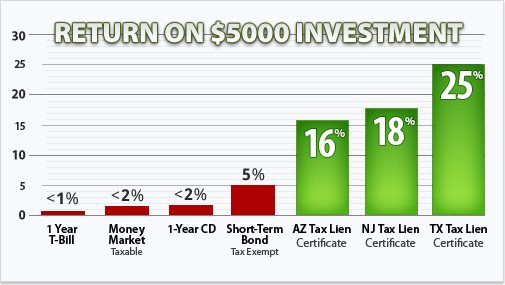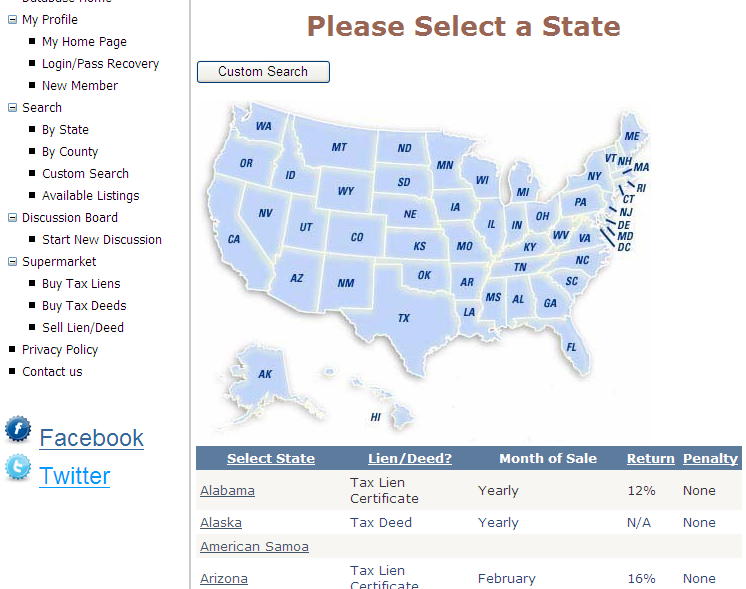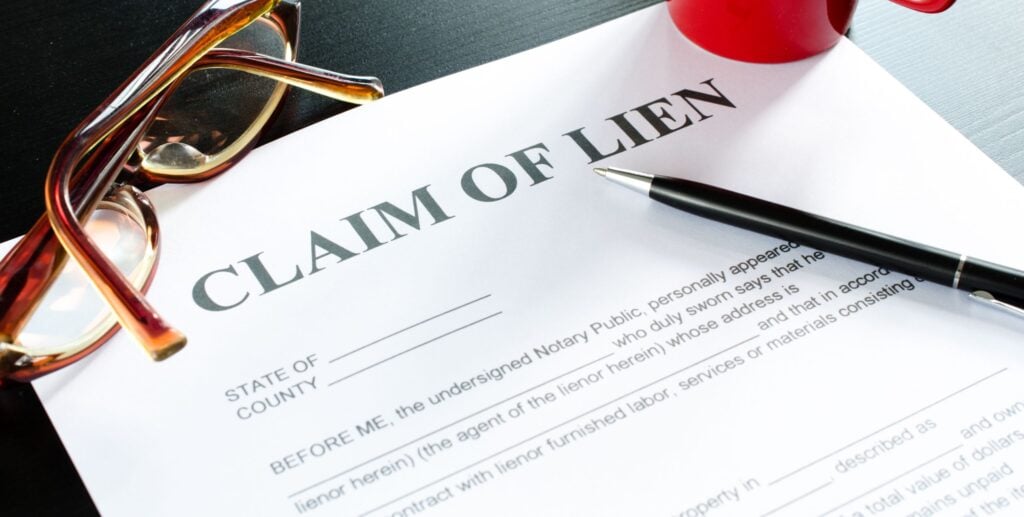All Categories
Featured
Table of Contents

There is a three year redemption duration for the majority of properties offered at the tax lien sale and during that time, the residential property still belongs to the evaluated owner. Very few building tax liens really go to act.
The rate of interest on taxes purchased at the tax obligation lien sale is 9 percent points over the price cut rate paid to the Reserve bank on September 1st. The price on your certification will stay the same for as lengthy as you hold that certification. The price of return for certificates marketed in 2024 will be fourteen percent.

The certifications will certainly be kept in the treasurer's office for safekeeping unless otherwise instructed. If the taxes for ensuing years come to be delinquent, you will be informed around July and given the chance to recommend the taxes to the certifications that you hold. You will certainly receive the very same rate of interest on subsequent taxes as on the original certificate.
The redemption period is three years from the date of the initial tax sale. You will get a 1099 type revealing the quantity of redemption interest paid to you, and a copy will likewise be sent to the Internal revenue service.
Investing in tax obligation liens and actions has the potential to be rather rewarding. It is also feasible to invest in tax liens and deeds with much less capital than may be needed for various other financial investments such as rental homes.
How To Invest In Tax Lien Certificates
Tax obligation liens might be levied on any type of type of property, from raw land to homes to industrial residential or commercial properties. The policies surrounding the kind of lien and exactly how such liens are issued and retrieved differs by state and by county. There are 2 primary courses, tax obligation liens and tax obligation actions. A tax lien is released instantly once they homeowner has actually fallen short to pay their tax obligations.

Such liens are then marketed to the public. A financier acquisitions the lien, therefore giving the district with the necessary tax obligation income, and then has the right to the residential property. If the building owner pays their taxes, the capitalist usually receives rate of interest which can be in the variety of 12-18%.
If the property is not retrieved, the capitalist may foreclose on the building. Tax obligation liens and deeds provide the possibility for charitable roi, potentially with lower amounts of resources. While there are specific danger elements, they are reasonably reduced. Tax lien investing is concentrated on the collection of interest and penalties (where offered) for the tax obligation debt.
The procedure for spending varies by state and by county. The majority of liens and actions are offered at public auction, with some auctions taking place in-person at a region court house, and some occurring online. You will normally require to register in breakthrough for such public auctions and may be needed to place a deposit to participate.
Tax Lien Real Estate Investing
In some territories, unsold liens or actions may be offered offer for sale "over-the-counter" from the region clerk's office or internet site after an auction has actually been completed. Prior to joining an auction, you will wish to carry out study to identify those residential properties you might be interested in and make sure there are no difficulties such as various other liens that may need to be settled or issues with the building itself that may create concerns if you were to take control of ownership.

This period is indicated to give the residential or commercial property proprietor a possibility to settle their financial debt with the tiring authority. With a lien, redemption means that your IRA or 401(k) will get a cash advance, with rate of interest and any appropriate fines being paid.
Tax obligation lien and action investing is an area where checkbook control is a must. You require to be able to release funds straight on brief notification, both for a down payment which must be signed up in the strategy entity name, and if you are the winning prospective buyer. With a Checkbook IRA LLC or Solo 401(k), you can directly make such payments from your strategy account immediately or 3rd party charges.
If you make a deposit and are not successful in bidding at public auction, the down payment can simply be gone back to the strategy account without inconvenience. The several days processing delay that includes functioning directly using a self-directed individual retirement account custodian just does not work in this room. When purchasing tax liens and deeds, you need to ensure that all activities are conducted under the umbrella of your strategy.
All expenditures related to tax lien investing must originate from the plan account directly, as all revenue created must be deposited to the plan account. tax lien investments. We are frequently asked if the strategy can pay for the account holder to go to a tax obligation lien training class, and recommend against that. Even if your investing activities will certainly be 100% with your plan and not include any type of individual investing in tax liens, the IRS can consider this self-dealing
Best States For Tax Lien Investing
This would certainly also hold true of getting a residential property via a tax obligation deed and after that holding that residential or commercial property as a leasing. If your method will include obtaining properties merely to turn about and re-sell those residential properties with or without rehabilitation that can be deemed a supplier task. If carried out regularly, this would reveal the IRA or Solo 401(k) to UBIT.
Just like any type of financial investment, there is threat linked with purchasing tax obligation liens and deeds. Capitalists must have the monetary experience to gauge and recognize the dangers, perform the required persistance, and properly carry out such financial investments in conformity IRS policies. Secure Advisors, LLC is not an investment expert or carrier, and does not recommend any type of certain financial investment.

The info above is educational in nature, and is not meant to be, nor ought to it be understood as supplying tax, lawful or investment advice.
What Is Tax Lien Real Estate Investing
Lien troubled property by regulation to protect repayment of taxes Pima County, Arizona overdue property tax list for public auction by the Region Treasurer A tax lien is a lien which is imposed upon a building by legislation in order to safeguard the repayment of tax obligations. A tax obligation lien may be imposed for the objective of collecting overdue taxes which are owed on real estate or personal effects, or it may be imposed as a result of a failing to pay income tax obligations or it might be enforced as an outcome of a failing to pay various other tax obligations.
Internal Income Code section 6321 provides: Sec. 6321. LIEN FOR TAX OBLIGATIONS. If any type of person accountable to pay any kind of tax obligation neglects or rejects to pay the same after need, the amount (including any type of interest, additional quantity, addition to tax obligation, or assessable fine, along with any prices that may accumulate in enhancement thereto) will be a lien in support of the USA upon all home and rights to home, whether genuine or individual, coming from such person.
Investing In Real Estate Tax Liens

Division of the Treasury). Normally, the "person reliant pay any tax obligation" explained in section 6321 has to pay the tax within ten days of the created notice and need. If the taxpayer stops working to pay the tax within the ten-day period, the tax obligation lien arises immediately (i.e., by operation of law), and is effective retroactively to (i.e., develops at) the date of the assessment, despite the fact that the ten-day duration necessarily expires after the assessment day.
A federal tax lien arising by law as defined over stands against the taxpayer without any kind of additional action by the government. The basic regulation is that where two or even more financial institutions have contending liens versus the very same home, the creditor whose lien was improved at the earlier time takes priority over the financial institution whose lien was refined at a later time (there are exceptions to this policy).
Table of Contents
Latest Posts
Property Back Taxes Owed
2020 Delinquent Tax List
Tax Owed Homes For Sale
More
Latest Posts
Property Back Taxes Owed
2020 Delinquent Tax List
Tax Owed Homes For Sale